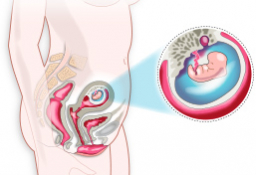Symptoms of the first month of pregnancy
Breast engorgement – it’s usually the first sign
Ovulation, and therefore fertilisation, occur during the first month. At the end of the month, there will be moments of uncertainty: am I pregnant or not? Are the symptoms I am feeling telling me my period is about to come or that I am expecting a baby? The discomforts of the first weeks of pregnancy are very particular and can change depending on the woman – and even on the pregnancy. You begin to notice the first symptoms of pregnancy, such as breast enlargement, the urge to urinate, fatigue, abdominal pain and others.
Changes in the mother
The first month of pregnancy is counted from the first day of the last menstruation, which means approximately two weeks before fertilisation. At the end of the second week, ovulation occurs. An oocyte is released, and if it is fertilised, it will implant in the uterus wall.
The first month of pregnancy is the month that is most overlooked, as until a missed period is noticed suspicions of pregnancy cannot be confirmed, although in some cases there is slight bleeding at the time of implantation.
Apart from the obvious missed period, other initial symptoms of pregnancy may appear. These symptoms are varied and are not always present. When they are, they can appear with different degrees of intensity and are different for every pregnancy. These symptoms can include fatigue, irritability, mood swings, nausea and vomiting.
Physical changes: first signs of pregnancy
- From the first month of pregnancy, many mothers-to-be expect to see the first signs: they usually notice changes in the womb, although the uterus has not yet increased in size, and it may feel somewhat swollen, with discomfort and shooting pain similar to the sensations of PMS.
- The first visible physical changes are the increase in breast tenderness, size and engorgement due to the rise of progesterone and oestrogen levels. There is also an increase in the urge to urinate due to increased blood flow, with more fluid passing through the kidneys.
- Some women have slight bleeding that lasts a couple of days. In these cases, although it generally has no effects, it is advisable to inform your gynaecologist.
Psychological changes: an emotional rollercoaster
- During a pregnancy, the physical changes are the most obvious, but there is an important psychological element to take into account.
- During the first month of pregnancy and even the first few months, it is normal to feel stressed and to be on edge, especially when it’s your first pregnancy, as all the changes and sensations are completely new. Doubts and unease are bound to appear as you face the unknown.
- What’s more, hormonal changes in the body produce emotional instability, which causes greater irritability and mood swings.
First month of pregnancy: 4 mm embryo
Fertilisation occurs with the union of egg and sperm. This union produces a zygote which begins to divide, forming a group of cells, and moves towards the uterus, where it implants on the ninth day after conception.
In the following days, this group of cells differentiates into three layers that will give rise to the central nervous system, digestive and urinary structures, as well as bones, muscles and the blood circulation system.
It is also during the first month of pregnancy that the amniotic cavity is formed, with the amniotic fluid inside. The placenta and umbilical cord also begin to form to transport oxygen and nutrients from the mother to the child.











